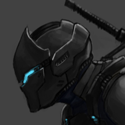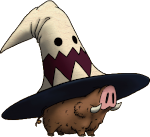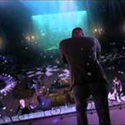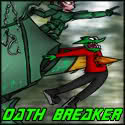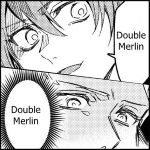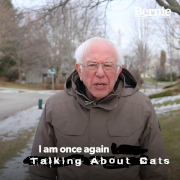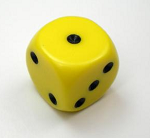|
Vulpes Vulpes posted:I've really gotten a hankering to put together a Spirit of 77 game based around car racing in exotic locales under the auspices of an underground race sponsored by a shady contessa. Basically Enter the Dragon crossed with Speed Racer, with the players alternatively racing and investigating the race. QuantumNinja's approach is the most direct, and what I ultimately did in a similar situation (decided to do a Mad Max AW game, so dropped the Driver and handed out cars and No poo poo Driver to everyone). That being said, the other thing I considered was giving everyone a car & A No poo poo Driver, but keeping the Driver anyways. The thinking there is, if you set up the situations correctly, the Driver becomes a lot like the Gunlugger. In AW, there are a number of combat playbooks, but the Gunlugger is by far the best at direct, uncomplicated violence. But it doesn't outshine everyone else in violence heavy AW games. Rather than dominating those games, the Gunlugger instead gets to make what are stupid decisions for everyone else and have it work out to their benefit. Potentially the Good Old Boy could work the same in a racing game. If you set up the races correctly, the Good Old Boy gets the schtick of trying to power through challenges with pure driving ability, even when this is a terrible idea narratively. A classic of race movies and shows is having challenges where, instead of just mashing the accelerator harder, the racers have to think on their feet. A draw bridge goes up, so now they have to find an alternate route on the fly. The Good Old Boy, though, is the character who decides to jump the bridge. If they make it - great! They get a big advantage or even win this race. If they partially succeed, now they need to baby a damaged vehicle to the finish line with the time they saved from the jump (or something similar threatens to negate the benefit they got from the jump). The reason I didn't keep the Driver, and the potential problem for the Good Old Boy too, is the A No poo poo Driver/Hot Wheels move. If you give it to everyone, the playbook is definitely weaker and needs a new move to make up for it. If you do keep it, they become so much better at driving that it's clearly unfair. Personally, in retrospect I found A No poo poo Driver (and by extension Hot Wheels) to be a problem inherently. Because bonuses are so small in PBTA games, adding the car stats on means a lot fewer misses and partial successes. In a game where you want a lot of action to take place in vehicles, this can be problematic. I never came up with a satisfactory solution that didn't require major overhaul to either car stats or completely re-writing the move. Your best bet might be to drop the Good Old Boy, and not giving everyone the moves and standard cars. Instead, I'd try doing cars as providing fewer bonuses and maybe a custom move. More work, but might give you a better outcome.
|
|
|
|

|
| # ? May 14, 2024 08:28 |
|
Yeah, that's the debate I'm having with myself. The options are either everyone with Hot Wheels of or no one- in both cases, the Good Old Boy is scrubbed.
|
|
|
|
Vulpes Vulpes posted:Yeah, that's the debate I'm having with myself. The options are either everyone with Hot Wheels of or no one- in both cases, the Good Old Boy is scrubbed. Or give the good old boy more options. Like, everyone gets hot wheels for free? Give the GOB an extra starting move and/or extra options for their ride. Like, everyone's got their corvettes and camaro's and they get the General Lee.
|
|
|
|
Yeah it's amazing how badly a *World game can go with strings of 10+ or 6- rolls and none of the interesting 7-9s. If you get +3 to stats it gets pretty bad. I ran AW a while back and had an entire session where nobody rolled less than a 10 - it was pretty boring for both players and GM. By comparison, I played in a Sprawl game before new years and just about everything was a 7-9 - and the game was far more interesting.
|
|
|
|
Comrade Gorbash posted:Personally, in retrospect I found A No poo poo Driver (and by extension Hot Wheels) to be a problem inherently. Because bonuses are so small in PBTA games, adding the car stats on means a lot fewer misses and partial successes. In a game where you want a lot of action to take place in vehicles, this can be problematic. This is definitely true. That move is a total mess in original AW, and the 2E preview removed it altogether. An alternative approach would be to flesh the vehicles out more, with attributes like say Power, Armor, Looks, Control, and Weakness. Then give everyone a move like: quote:Behind the Wheel. When in the driver’s seat... I don't know if this is good, but here is a set of rules for treating cars like secondary playbooks. The idea is that there are a set of moves for the cars themselves that mirror the standard moves, and everyone uses them for the race scenes. Things like Read the Sitch or shooting at someone should still work off your player stats: if the rules aren't there, default to the normal ruleset. I'm not sure that document are super-balanced, or even reasonable (I literally just wrote it in ~1 hour), but maybe it's a step in the right direction? (Feedback, of course, would be awesome.) QuantumNinja fucked around with this message at 03:07 on Jan 11, 2016 |
|
|
|
madadric posted:Today my PBTA hack, Impulse Drive got added to the roster of character sheets for Roll20, so now along with the rules and handouts you can play misfits in spaceships with sheets that do all the calculations for you. I'm not showing it on the drop down menu when creating a game. Edit: Nevermind, it's not under PbtA, it's a separate heading.
|
|
|
|
When I ported the Driving Move to Masks, I allowed any stat to use the driving move, but the consequences changed. I also gave different moves for the driver, passenger, back seat windows, and the camel seat. For Reference.
|
|
|
|
Is this a good thread to talk about Blades in the Dark, given that it's in the OP? I just bit the bullet and bought the "early access" version and it's got me pretty starry-eyed, especially given my love for Dishonored and Thief games. I'm actually considering postponing my alt-universe WWI fantasy game until I can hack Blades in the Dark to work for it, because something similar to that would, I think, be a much better fit than Savage Worlds given that it's going to start with the players being scapegoated for a major crime and forcing them into the shadows. Savage Worlds is much more action and combat-focused.xiw posted:Yeah it's amazing how badly a *World game can go with strings of 10+ or 6- rolls and none of the interesting 7-9s. If you get +3 to stats it gets pretty bad. I started to get fatigued in my last in-person DW game when everyone had a couple of +3 stats and failure just became less and less of a thing, so that's when we wrapped up the story. Luckily the conclusion was suitably bonkers and involved the Necromancer stuffing the corpse of an impossibly massive cosmic dragon into a loving canopic jar and then releasing it later to tear the main villain's clocktower in half while another character battled with her at the top, the two stabbing one another fatally simultaneously as the tower collapsed. Yeah, that was a good game.
|
|
|
|
It's not a bad place but there is a Blades thread.
|
|
|
|
Just wanted to say I ran my first game of Impulse Drive last night and the group is so psyched we are now doing a definite weekly game on roll20. The system rules, and the rules really bring a great feeling to the setting seamlessly.
|
|
|
|
Finally playing MoTW weekly. We forgot about luck rolls until mid-session; we somehow botched the 3 of the 4 rolls we made, getting us ejected from the crime scene, nearly arrested, and then almost eaten by crocodiles. So many neat character classes... Golden Bee fucked around with this message at 19:05 on Jan 14, 2016 |
|
|
Harrow posted:I started to get fatigued in my last in-person DW game when everyone had a couple of +3 stats and failure just became less and less of a thing, so that's when we wrapped up the story. Luckily the conclusion was suitably bonkers and involved the Necromancer stuffing the corpse of an impossibly massive cosmic dragon into a loving canopic jar and then releasing it later to tear the main villain's clocktower in half while another character battled with her at the top, the two stabbing one another fatally simultaneously as the tower collapsed. Our group sort of embraced the idea of getting characters to a point where the 'retire the character to safety' would make sense and then pulling the trigger. Th secondary characters should, hopefully, be well established at that point and the campaign can continue on if people are still interested.
|
|
|
|
|
New version of K6BD RPG is out:quote:Here's the major changes:
|
|
|
|
Fenarisk posted:Just wanted to say I ran my first game of Impulse Drive last night and the group is so psyched we are now doing a definite weekly game on roll20. The system rules, and the rules really bring a great feeling to the setting seamlessly. Oh wow, thanks for the feedback! Was there anything that felt like a gap in the rules or content provided where you had to make any rulings? It's hard to spot these when you GM a game you wrote.
|
|
|
|
madadric posted:Oh wow, thanks for the feedback! Was there anything that felt like a gap in the rules or content provided where you had to make any rulings? It's hard to spot these when you GM a game you wrote. The next session is tomorrow, if anything like that comes about I'll be sure to post about it though.
|
|
|
|
Fans of World Wide Wrestling may be interested to know that Nathan Paoletta recently publicly released beta playtest documents for an supplement, World Wide Wrestling: International Incident which includes stuff like rules for Luchadores, Japanese Puroresu and other similar "Wrestling around the world" stuff. http://ndpdesign.com/playtest
|
|
|
|
I'm planning a hack and I could use some help brainstorming. My idea is for a campaign where the players are all Time Cops* intent on stopping Time Crime, and chasing Time Perps who try and steal things or murder people and flee through multiple different epochs, dealing with challenges on the way. (there is already the Timewatch kickstarter for the Gumshoe system, but I missed the boat on that, and the type of game I want to run is more AW style anyway) * Temporal Integrity Maintenance/Enforcement and Chronological Order Protection Squad So I'm thinking up playbooks. I want to play heavily to cop movie tropes and detective stereotypes, and there's a lot of material to go on there, but I'm having trouble with the basic divide into niche-protected 'classes'. I thought about distinguishing the academy ace, the loose cannon, the by-the-book cop, the two-days-from-retirement cop, the raised-on-the-streets cop, but those all seem to come out as character backgrounds (like DW's Race moves) rather than fully-fleshed archetypes with roles to play in the procedural. They could each be a move or two, but I don't think they're enough for a playbook (or are they?). When I think more about niches, they are less tropey and more 'D&D adventuring party' type stuff, which I'm also not sure about : The tech specialist. The detective. The SWAT guy. The psych. The undercover cop. The FBI agent. Those seem a bit too clinical, without enough archetypical baggage to define them and help the players play into their roles. What do you guys think of the divide? I kinda just want someone to go through this thought process with me. Stats are probably gonna be the AW stats reflavoured as something (Discipline, Brutality, Moxie, Acumen, weird fifth one?). There are definitely gonna be XP awards or forwards or something for James Bond/CSI style one-liners delivered in a grizzly voice
|
|
|
|
Boing posted:I'm planning a hack and I could use some help brainstorming. My idea is for a campaign where the players are all Time Cops* intent on stopping Time Crime, and chasing Time Perps who try and steal things or murder people and flee through multiple different epochs, dealing with challenges on the way. (there is already the Timewatch kickstarter for the Gumshoe system, but I missed the boat on that, and the type of game I want to run is more AW style anyway) First things that come to mind. 1. if you're cops then combat should be limited. Like, cut the gunlugger and most of the battlebabe, and people shouldn't carry more than a pistol (maybe not even that depending on time period) 2. If you haven't seen it yet, I would check out gnome7's clock mage. Yes its for dw and not aw, but every move in there is about messing with time in ways that are fun and move the game forward rather than cause headaches. If I were you, I'd look at it for inspiration for time based basic or playbook moves. Also Ettin's Retrocausality comes to mind. Abilities like Gemini (bring in another copy of yourself to help for a short time) seem like good inspiration for moves. 3. Class ideas The Butterfly: your loose cannon renegade who doesn't play by the rules. Battlebabe-ish without the combat. The TSI: time scene investigation. Part brainer, part tech wizard. All about gathering info and clues.
|
|
|
|
Boing posted:I'm planning a hack and I could use some help brainstorming. My idea is for a campaign where the players are all Time Cops* intent on stopping Time Crime, and chasing Time Perps who try and steal things or murder people and flee through multiple different epochs, dealing with challenges on the way. (there is already the Timewatch kickstarter for the Gumshoe system, but I missed the boat on that, and the type of game I want to run is more AW style anyway) A good way to look at the playbooks in core Apocalypse World at least is that they're actually 9 sub-RPGs masquerading as a single game. The game the Skinner is playing is actually radically different to the one the Gunlugger or the Hardholder are playing, both in objective, mechanics, rules used and "feel". Think about what the sub-games that can be played under the umbrella of "Time Cop". As a spitball, the actual CSI guy who does down-to-earth police work, the loose cannon who just wants to get in the same room as the bad guy and gently caress due process, the lab guy who can get you all the answers you need as long as somebody does the legwork, the chief who has to deal with the legit bureaucracy and ensuring that the Time Code is followed, the time travel consultant who doesn't know more than the basics of actual policing but can speak ancient Greek and tell you what first century Chinese court advisors wore. Think about the different facets of gameplay and work out what the "game" for each one is, then siphon those off into playbooks. Work what the playbooks who look nothing like each other look like first.
|
|
|
|
Doodmons posted:A good way to look at the playbooks in core Apocalypse World at least is that they're actually 9 sub-RPGs masquerading as a single game. The game the Skinner is playing is actually radically different to the one the Gunlugger or the Hardholder are playing, both in objective, mechanics, rules used and "feel". Think about what the sub-games that can be played under the umbrella of "Time Cop". As a spitball, the actual CSI guy who does down-to-earth police work, the loose cannon who just wants to get in the same room as the bad guy and gently caress due process, the lab guy who can get you all the answers you need as long as somebody does the legwork, the chief who has to deal with the legit bureaucracy and ensuring that the Time Code is followed, the time travel consultant who doesn't know more than the basics of actual policing but can speak ancient Greek and tell you what first century Chinese court advisors wore. Think about the different facets of gameplay and work out what the "game" for each one is, then siphon those off into playbooks. Work what the playbooks who look nothing like each other look like first. This is great advice. But I worry that this sort of approach leads to everyone playing their own little minigames independently of each other, and not really working as a team as if they were part of a DW-style adventuring party. Is that just one of the risks inherent in going AW-style?
|
|
|
|
Boing posted:This is great advice. But I worry that this sort of approach leads to everyone playing their own little minigames independently of each other, and not really working as a team as if they were part of a DW-style adventuring party. Is that just one of the risks inherent in going AW-style? This is actually the difference between good and bad hacks of the system. If you want people to work together in the *World system they'd better be doing it to advance their individual agendas. It's not really designed for team-play like Dungeon World and others try to push towards.
|
|
|
|
Impermanent posted:It's not really designed for team-play like Dungeon World and others try to push towards. May I ask you what makes you say this? I don't understand much about game design, but I do know that a lot of PBTA stuff tends toward self-interested characters, and would like to know what exactly leads in that direction.
|
|
|
paradoxGentleman posted:May I ask you what makes you say this? I don't understand much about game design, but I do know that a lot of PBTA stuff tends toward self-interested characters, and would like to know what exactly leads in that direction. There are a couple reasons for this. First, in a well designed PbtA game, the playbooks will have different tones and themes from each other, so that they naturally fall into their own storylines with the PC as the main character, and the other PCs falling into secondary roles. Second, the system is aggressively player-facing, and encourages proactivity on the part of the PCs, as all mechanical successes and failures derive from the actions taken by the characters, rather than as reactions to the environment. This encourages players to look out for themselves and to do the minimum risky behavior in order to get what they want. It's a situation where the mechanics encourage pushing the buck, and letting someone else do the mechanical heavy lifting while you reap the narrative benefits. This is why one of the core MC moves is to split people up.
|
|
|
|
|
Meinberg posted:There are a couple reasons for this. First, in a well designed PbtA game, the playbooks will have different tones and themes from each other, so that they naturally fall into their own storylines with the PC as the main character, and the other PCs falling into secondary roles. Second, the system is aggressively player-facing, and encourages proactivity on the part of the PCs, as all mechanical successes and failures derive from the actions taken by the characters, rather than as reactions to the environment. This encourages players to look out for themselves and to do the minimum risky behavior in order to get what they want. It's a situation where the mechanics encourage pushing the buck, and letting someone else do the mechanical heavy lifting while you reap the narrative benefits. Either what you mean by tones and themes is more like approaches and perspectives or this is wrong. A party based game where each class is designed with dissonant tone and which does not contribute to an overarching theme of the game is a poorly designed game. Certainly classes must have their own unique approach to the game, but no class should ever be monolithic, a class that can handle the whole story entirely by means of its unique approach is a bad class, and ruins the game for the rest of the players. These games are supposed to be party based, and the story that forms ought to be about how each characters individual aim aligned them with the others. Thats not to say they always accomplish their goal, of course. The fact that the classes in Apocalypse world are playing their own minigames to the extent that they dont necessarily need each other is a failure of the design of its playbooks, not a feature. That kind of style makes sense if you want to encourage PvP situations but thats frankly a horrible idea in a group narrative based game, it plays to all the weaknesses of the system and none of its strengths. Maybe its just because of the playgroup I have, but I can't imagine a player sitting down and not wanting to make moves. I get what you're saying about the game putting all the risk upon those taking action, but I just don't understand the mentality of someone who would be..is lazy the right word? In an a rpg like this. Why would you show up? That player probably exists but I've not met them. If they were to show up at one of my games, I'd probably start making other player's failures into problems for them, just to get them up off their rear end. Anyways, while characters should absolutely have their own selfish goals, a GM that cannot create the right kind of necessity to band them together is just a bad GM. Storytelling is hard, and its harder still when players have so much say in the direction, but if everyone is going off on their own path its the GM's job to make sure those paths have a clear intersection.
|
|
|
|
I think you're confusing 'not interacting with the story' with risk-aversion. In systems where a 6- doesn't give XP (or even ones where it does and you get plenty of XP anyway), people solve things with their dominant attributes. Even *AW fans like myself who've played 11+ implementations of the system. When I'm the clever lad, I'm using +Sharp. When I'm the honeypot, it's +Smooth. Fighters are +Strength. This is naturally how people interact with their worlds (play to your strengths) for a variety of reasons, but I don't want to expound on player psyche. People have done it better and longer.
|
|
|
|
MANIFEST DESTINY posted:These games are supposed to be party based, and the story that forms ought to be about how each characters individual aim aligned them with the others. Note that this is markedly different from "everybody off doing their own thing," because yeah, that sucks. But avoiding PvP? Why, when PvP produces some of the most compelling stories? And when I say "PvP," let's be clear that there is a spectrum here. You don't have to be shooting someone in the head to be engaged in PvP. Hell, seduce or manipulate is PvP. The point is, if everyone is "working together cooperatively to accomplish a mutually shared goal," you're missing out on a lot of the really interesting stuff that makes AW really shine. ALL of the characters should have their own agendas. When those agendas align, the characters work together; but the MC should be looking for ways to set those agendas in opposition, because then the story is truly in the players' hands and not the MC's.
|
|
|
|
Ilor posted:Actually, this is pretty explicitly NOT the case with Apocalypse World. Orthogonal or outright competing agendas are often the norm. You start out more or less on the same side, but you don't have to stay that way. The story is about how the characters do (or don't) work together and the resulting situations in which they collectively find themselves. I find "party-based" AW play kind of boring, really, because the PCs typically make MUCH better adversaries than the NPCs (again, by design). This guy gets it.
|
|
|
|
I should add the caveat that though I've read through it a few times I've never run Apocalypse World, since its take on the setting never much appealed to me and my playgroup finds stuff like sex-moves really creepy. I agree that narratively, yes players in opposition can make for interesting story, but when it gets past the point of arguing over direction and approach and into mechanic-invoking opposition I don't feel that the game handles it well enough. Maybe its my players or my own inexperience with it but it just seems like opposing actions happening on a -6 works great when its players vs the world, but when its player vs player it can devolve into a bad game of cops and robbers. Or even worse in my opinion, it can devolve into a divided group that causes tons of downtime for players as you're off dealing with one or two people's poo poo that doesn't apply to them. Down time for a player is my biggest pet peeve, and that may be why I'm so concerned with maintaining teamwork. I do feel like there's still a ton of opposition between players in my group, but only in opinion. They love to debate the best possible course of action until they're blue in the face, so sometimes I have to start narrating things in real time just to get them to settle on a decision. Its really what is most interesting about the game, the absurd solutions they come up with that are born from compromise between really different personalities. We've been running lately a sci-fi PBTA-based game that I developed for them, which really ramps up the teamwork aspect because they're a starship crew cut off from home surrounded by alien civilizations that they discover one by one. Nothing out there is truly their friend, so its teamwork through necessity and it works well for them. Last session, they were paralyzed by inaction because they heard the alien race they just ran into considers bipedal animals as vermin, they debated a million ways to get away or fight until they eventually formulated an elaborate plan to pass off the ship's pet dog as their captain and all the humans as the dog's crew of slaves. Go team!
|
|
|
|
MANIFEST DESTINY posted:I agree that narratively, yes players in opposition can make for interesting story, but when it gets past the point of arguing over direction and approach and into mechanic-invoking opposition I don't feel that the game handles it well enough. MANIFEST DESTINY posted:Maybe its my players or my own inexperience with it but it just seems like opposing actions happening on a -6 works great when its players vs the world, but when its player vs player it can devolve into a bad game of cops and robbers. MANIFEST DESTINY posted:Or even worse in my opinion, it can devolve into a divided group that causes tons of downtime for players as you're off dealing with one or two people's poo poo that doesn't apply to them. Down time for a player is my biggest pet peeve, and that may be why I'm so concerned with maintaining teamwork. MANIFEST DESTINY posted:I do feel like there's still a ton of opposition between players in my group, but only in opinion. They love to debate the best possible course of action until they're blue in the face, so sometimes I have to start narrating things in real time just to get them to settle on a decision. Its really what is most interesting about the game, the absurd solutions they come up with that are born from compromise between really different personalities. We've been running lately a sci-fi PBTA-based game that I developed for them, which really ramps up the teamwork aspect because they're a starship crew cut off from home surrounded by alien civilizations that they discover one by one. Nothing out there is truly their friend, so its teamwork through necessity and it works well for them. Last session, they were paralyzed by inaction because they heard the alien race they just ran into considers bipedal animals as vermin, they debated a million ways to get away or fight until they eventually formulated an elaborate plan to pass off the ship's pet dog as their captain and all the humans as the dog's crew of slaves. Go team! It sounds like your game is heavily exploration-based, and that's cool. A lot of people like the "discovery of the unknown" thing in RPGs, and that can be a lot of fun with a group of like-minded people. But a number of times I've encountered games like this, they were just an excuse that GMs used to parade the players through a series of set-piece "look at how clever my setting is!" sessions, where the players had little or no input into the direction of the story. What happens if a member of the crew decides that a particular alien civilization is pretty rad and wants to be a part of it? Or thinks it is completely intolerable and it's worth aborting the (presumably long and winding and uncertain) trip home in order to stand and fight against it by whatever means necessary?
|
|
|
|
People who automatically dismiss sex in gaming and oppositional gameplay need to get 400ccs of Monsterhearts. No game does messy, emotional, conflicted stuff better. Of course, it requires a table full of mature players, so the odds of someone discovering it by pick-up-and-play are close to nil. Fiasco is another game of "Screw you...wait, drat!", with a lot of the ethos of *AW (play to find out what happens!) but without the arbitration of an MC. It also requires a group on the same page. ---- I'm really happy with Hollyworld, with one caveat: I think I should use "Stress" as a harm-clock. Has anyone really thought about the difference between the traditional *AW Harmclock and the Masks "Take a Powerful Blow?"
|
|
|
|
Ilor posted:Are you kidding? AW handles it better than most games because the mechanics are specifically designed to avoid taking away player agency (e.g. go aggro and seduce or manipulate). It has mechanics that specifically help address metagaming player vs. character knowledge (e.g. read a person) and give a mechanical advantage to the latter over the former (as in, "yeah, I know you're lying, but if I can score at least a 7 to read you, my character will know it too, and knowing it gives me a tangible +1 bonus"). I get what you're saying, I think maybe I'm biased because it would just never work with my group. They're all close friends, and when one of them gets going on too much of a tangent the rest of them reel him or her back in. Are they missing out by doing so? Perhaps, but they collectively take pride in their group's accomplishments in the end and that what they show up for, it seems to me. We play a lot of other purely pvp competitive board games together, so maybe all the antagonism gets worked out there, but I think the bigger reason is that we're roleplay-lite. They essentially play themselves, which is why previously I was writing Dungeon World classes specifically for them and now have built an entire game around their (and my own of course) sci-fi fandom. Half the time they don't even give their characters a name, just calling each other by their real name... They'd probably take it personally if someone else in the group was actively trying to subvert them. Maybe after they've got more experience under their belts it will start happening and we'll see. Ilor posted:This may be a preferences thing, but if the story is such that the characters' agendas are working at cross-purposes (or even at odds), I find it keeps everyone at the table engaged even if their character isn't "on screen," simply because everyone's going, "Oh, poo poo, what's gonna happen next and how am I gonna deal with the fallout?" This is doubly true if you're soliciting world-building or setting-framing details from the table-at-large. I've just been tailoring things based on feedback and what I see at the table. 2/5ths of the group are just way too excited about rolling dice, the rest are all about figuring out the politics and schemes going on in the world and picking sides or subverting the npc factions. I've thought about putting the dice rollers off screen and giving the others something to work out in the meantime but its very hard to juggle one side's need for move-heavy action and the other's need for exposition and conversational combat. This is why in the sci-fi game I've thrown them into the middle of a many sided war, there's always someone to fight or run from while the information people have a lot of work to do to figure out who exactly needs to be fought or avoided. The game has moves for uncovering plots in lots of ways (hacking, telepathy, interrogation etc). Ilor posted:Yeah, that's not really opposition. And having run games like that (my Shadowrun games especially, where players would hash out plans and contingencies for hours if not prodded to action), it just gets tiring and boring to me after a while. Like, "oh, look, another predictable disagreement between Action Jackson and Dr. Paranoiac." As to your last question, what happens is they make their case. If a player was really bound and determined to split off, they can if they're willing to be the B-plot for a while, because the larger group is going to inevitably get more attention. I'd be stuck trying to steer them back together by making the problems of one side ripple into problems for the other. It hasn't come up though, because they're self-policing. I think it helps that I wrote the classes as specific roles on the ship, they all have a very clearly defined job and its made them more naturally cohesive as a team, they route for each other. There's a lot of aspects of the game that involve players making moves in conjunction (helmsman piloting while tactical fires and the engineer is fixing the damage from the last hit, all the while the captain is giving their bard-like bonuses and so forth). Anyways the takeaway is that I think my opinions on AW are just colored by the style of my playgroup, beyond being not sure that that kind of oppositional play would work well, I think it just will never come up. But who knows. MANIFEST DESTINY fucked around with this message at 07:45 on Jan 21, 2016 |
|
|
|
Players calling each other by their first name...that's going to be for oppositional play what water is to dynamite.
|
|
|
|
I'm one of Ilor's players so it probably won't surprise people that I agree with what he's saying. AW's PVP is weak in some ways - the same mechanics that make PC vs NPC combat fast and fun can make PC vs PC very abrupt, with a distinct advantage to whoever gets off the mark first. In my experience, that sort of PVP happens rarely, and only with a fair amount of build-up. PCs end up having so much power in AW that outright killing one is a waste. Our larger gaming circle has argued a lot about PVP and while I'm a fan, I think it's only fun when the system lets it be fun. We used to play a lot of Shadowrun 3E and PVP there just sucked. - the social contract in SR3 implicitly puts all players on the same side. Having someone turn against another PC upsets the dynamic. Worse, it usually weakens the party. PVP at the wrong time can turn a simple mission into a TPK. Compare to AW where the PCs often inhabit different corners of the area. They may form teams to get things done, but for us, it's rare to see the entire party working together on the same thing at the same time. I think the social contract is the most important issue. I'm always a little baffled by people who hate PVP in RPGs on principle but who will cheerfully play other games ranging from Munchkin to Axis & Allies. - SR3 character creation can take a while, and beginning characters are considerably weaker than experience characters. Losing a character for any reason is a big setback for the player and can really piss people off. In AW your next character is less than ten minutes away and will be awesome. I'm a lot more willing to risk my character's survival if I know I'll be right back in the swing of it soon. - SR3 combat is granular and a knock-down, drag-out fight can take a while. At least once this worked for me - a long time ago I was GMing a low power level SR2 campaign and a festering disagreement between a street ganger and a hacker who had been forced into hiding together erupted into a slapfight in a safehouse bathroom, and the other players couldn't stop laughing. Usually it's just a drag, though, as people pull out their big guns and use all their tricks on every important roll. You can end up accomplishing nothing for an entire session because one PVP incident went on too long, and the other players wish they'd gone to the movies instead.
|
|
|
|
AW is 100% not for cooperative party play, and 100% reliant on cooperative group play (but the latter basically goes for everything, natch). That being said, it's not a great idea to start your players with opposed agendas, because again, the system admittedly doesn't handle PvP as well as it does PvMC. It still works fairly well, but what I've found, even in the pseudonymous PbP games on the forums that I've run, most people don't want to come into direct conflict. So don't set that up. Run your PCs at cross purposes, not opposed ones. Don't be afraid to have your PCs running at parallel purposes, either. I understand totally the drive to push PCs together, but sometimes that's not what makes sense for the characters, so don't force it. I also will always remember this: I had an extremely strong AW game going until I pushed the PCs all on the same side with the same overall agenda and effectively into a party. The game fell apart and died rapidly after that, since the system simply didn't support that scenario the same engaging way that multiple fronts and multiple agendas are.
|
|
|
|
This sort-of explains why the first time I played AW it was a disaster because I had only played DW before, and the playstyles are completely and totally different despite the similarities in system. I suppose I prefer the team-based adventure game paradigm more than the 'everyone is a dick to each other' paradigm, so I'm gonna look more at DW playbooks for inspiration.
|
|
|
|
Zorak of Michigan posted:I'm one of Ilor's players so it probably won't surprise people that I agree with what he's saying. AW's PVP is weak in some ways - the same mechanics that make PC vs NPC combat fast and fun can make PC vs PC very abrupt, with a distinct advantage to whoever gets off the mark first. In my experience, that sort of PVP happens rarely, and only with a fair amount of build-up. PCs end up having so much power in AW that outright killing one is a waste. A lot of people assume pvp starts when characters start trying to kill each other. In Apocalypse World, pvp starts with seduce or manipulate, or the brainer moves, or the skinner moves, or read a sitch. You have so many antagonistic tools to interact with other pcs that aren't live or die stakes, that's where pvp lives in apocalypse world. I've seen this in my own game. A player tried to fight an advanced gunlugger with their new hocus and cult, and got creamed because their pvp is manipulation not combat. It was quick an brutal and that guy got seriously messed up. The player then made a skinner, and played him hot and desirable, and manipulated the gunlugger to get what he wanted. Violence may be the crescendo of pvp, but in order to have that violent, gory crash of opposing desires, you need the buildup of tension, the setting of stakes and the simmering of resentments between pcs. That's what all those other moves are for.
|
|
|
|
Totally. I may even be of the controversial opinion that violent pvp is a fail-state of a game. Everyone should be bouncing and grating across each other but should always have bigger fish to fry than each other.
|
|
|
|
Yeah, manipulate in particular is PvP gold. I love the way that move is structured.
|
|
|
|
All of this sounds great but in practice it just means I have half the table on their phones while the other half gets to do interesting things, then vice versa. I've always felt like this was either me needing to push them towards the same overall goals, or just better time management to keep everyone engaged and not waiting too long between getting to do something. Is there some delicate balance I'm missing here, and if so any advice on said balance?
|
|
|
|

|
| # ? May 14, 2024 08:28 |
|
Don't forget to take commercial breaks. Imagine this. The Gunlugger and the Battlebabe are in a tight spot, fighting against the hideous cannibals of Ring 8. The Gunlugger just mowed down a couple with his MG but took shrapnel fire in return and that harm was way worse than it looked. The Battlebabe says 'I'm going to shout at him that I'll cover him if he can get to his feet.' and the MC says 'Sounds great but hold those dice, we'll be right back. Brainer, you're back at the ranch working on the cannibal that got those two into this mess, what're you doing now?"
|
|
|
|









